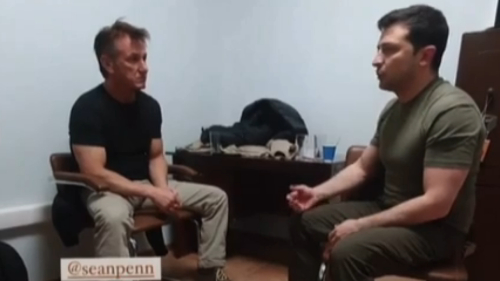
There are a few Hollywood-specific items we could talk about this week, be it CODA taking the pole position for Best Picture after the SAG Awards, or IATSE Local 839 — the Animation Guild — having filed paperwork with the National Labor Relations Board to oversee a vote on whether workers on Adult Swim’s Rick and Morty and Hulu’s Solar Opposites can unionize. As the Verge tells it, this came about because “the productions’ parent studios, Adult Swim and 20th Century Fox, were not willing to voluntarily recognize the entire unit as was proposed by the Animation Guild.”
And therein lies much of the tension surrounding the role of labor, and unions, in Hollywood. Shows like Rick and Morty, and indeed all of Adult Swim, have a kind of ironic/meta/hipster vibe (we are restoring “meta,” by the way, to its pre-Zuckerberg meaning) and a willingness to challenge conventions and upend norms, etc., just so long as that Craftsman bungalow in Silver Lake or Larchmont Village is paid for. But of course, those pricey digs usually house the creative classes who exist between the non-unionized, apartment-dwelling office and production workers, and those who call the shots from mansions Bel Air, Riyadh, London, or elsewhere.
But it’s also become quite an interesting time for the ownership class – and everyone else – in the interval since the last column, as a big new war has broken out in Europe, thus making it unavoidable to deal with for much of the First World.
Given that folks are likely dying in that war, as these words are being tapped out, and the aggressor is a nuclear power run by what would be called an “unreliable narrator” in the writing biz, well, it sorta puts the whole business of awards handicapping and general Hollywood jockeying into perspective, que no?
One suspects there will be a lot of “standing with Ukraine” by the time Oscars roll around, if things haven’t somehow miraculously been settled by then, and as some have already speculated, look for a lot of blue and yellow on the red carpet this year.

In fact, Hollywood has already mobilized, as Warner Bros. pulled The Batman from release in Russia and Sony withdrew its own long-delayed Morbius movie. Disney, Paramount and Universal pledged to do the same with their upcoming films, while Apple is pulling sales and availability of its products as well. Does that mean no OS updates for the Russians, or access to online files? Stay tuned…
Elsewhere, Netflix announced it would not comply with Russian rules to carry state-backed channels there, and DirecTV also said it would stop carrying the state-run RT America as well, though outlets like Fox and NewsMax will doubtless continue filling in for them. And in yet another slamming of the barn door long after the horses left, even major social media platforms such as YouTube, Facebook and Twitter have announced restrictions on Russian state propaganda, though platforms like Telegram will presumably remain available for the disinfo-flow.
Meanwhile, banks around the world that blithely laundered oligarch money for years are now swinging into “sanction” mode (including Switzerland, whose economy is largely reliant on its “no questions asked” banking policy), and even a few oil companies (which have never been too concerned with the health of the planet) have declared they will stop doing business with Putin & Co. — this while the folks in Ukraine keep showing a heartening and inspiring resilience to unprovoked invasion.

Even China remains carefully neutral, for now. And while it’s hard to imagine China suddenly wanting more Tiananmen Squares by declaring a belief in self-determination (they didn’t even like Hong Kong “as is,” when they acquired it), they have, so far, not been willing to bail Russia out with their own alternative banking system. This likely comes from preferring stability, as that murky abyss is bad for markets and economies, no matter what your form of government.
Hollywood’s own history, though, shows that the industry hasn’t always been this quick to make stands against totalitarian aggression — the movie biz having never been quite as avant-garde as the criticisms from the far right would suggest. In the ’30s, for example, Germany was the largest foreign market for Tinseltown product, so there was a too-long hesitancy in criticizing Nazis and fascists in films. As one PBS story had it, this was due to “a complex combination of American isolationism and anti-Semitism [leading] to a 1934 Production Code Administration (PCA was the Industry’s content self-regulator) ban on anti-Nazi propaganda in films.”
The brothers Warner bucked up against those prohibitions early on, though, and finally, when it occurred to most of America that, “hey, Nazis are bad!” — we await similar revelation in large swaths of the country today — Hollywood then started producing things like The Great Dictator, Casablanca, et al.
The global response to the invasion of Ukraine has been swift and encouraging, and it may be giving China pause, but should that world leader actually wind up invading Taiwan — which it feels similarly entitled to — at some point, Hollywood might find itself in a pickle more reminiscent of a 1930s moment than the current one that has prompted outrage across the globe.

The LA Times’ “Company Town” column has been providing some insightful coverage of Hollywood’s “strange relationship with China” this past month, noting previous inexcusable behavior such as changing the ending of Fight Club for a mainland streaming service with “the cops thwarting Project Mayhem’s plot to blow up buildings that contain debt records. In the Chinese version, the movie stopped before the explosions and a text card revealed that, after being tipped off, ‘Police rapidly figured out the whole plan and arrested all criminals, successfully preventing the bomb from exploding.’” Scary stuff, but the studio was allowed to do it because director David Fincher didn’t have final cut on that picture.
Though the ending of Fight Club was eventually restored, the original edit was proof of many unseemly changes made to gain access to a large, untapped market that was viewed as a source of new revenue just as DVD sales stopped providing much money for studios. Of course, Chinese box office has seemingly gone the same route as DVD sales, with “U.S. movies and imports from other countries [taking] up a meager 15.5 percent of China’s ticket sales last year, compared with 36 percent in 2019.”
So perhaps, then, there will no longer be enough money on that particular table to compel actors like John Cena into making a video apologizing for actually calling Taiwan a separate country.
This is in contrast to Sean Penn having to walk to the Polish border after filming a behind-the-lines documentary in Ukraine; Ryan Reynolds and Blake Lively announcing they’d match UN funds up to a million dollars to help refugees from the area; and Reynolds and co-star Mark Ruffalo’s comments at the premiere of Netflix’s time-travel movie The Adam Project, where Ruffalo said the resistance to the invasion is “what it looks like when people come together to fight for something that’s right. I’m praying they succeed in what they’re trying to do.”
These days, Hollywood is eager to jump into the fray, to the degree that its stars can. Contradictions remain, of course, as the actual capital used to make its product will seek lower costs where they can find them, whether the soundstages of the former Eastern Bloc, post houses in Taiwan or India, or no-right-to-vote states domestically.
Even the announced pull-backs of studio releases aren’t that much of a hit to the collective pocketbook, as a Gizmodo take on the canceled releases notes “these gestures are powerful but ultimately, not a huge loss monetarily… Nevertheless, the optics of these moves and the strong support of Ukraine it shows is surely more important than whatever money may or may not be made on future films.”
Perhaps. One senses a century ahead of even harder calls to make, and there will be many more opportunities for Hollywood — and other communities — to literally put their money where their mouths are.
After all, the world was always more interconnected than we were willing to admit, as a species. Now that it’s exploding, only pulling back from the aforementioned abyss will let the show, the union organizing, heck even the self-congratulations of award season, go on as planned.
To whatever degree the world still lends itself to “planning.” On which note, I’ll see you in a week…
 Mark London Williams is a BTL alum who currently covers Hollywood, its contents and discontents, in his recurring “Across the Pond” dispatch for British Cinematographer magazine, contributes to other showbiz and production-minded sites, and musters out the occasional zombie, pandemic-themed, or demon-tinged book and script, causing an increased blurring in terms of what still feels like “fiction.”
Mark London Williams is a BTL alum who currently covers Hollywood, its contents and discontents, in his recurring “Across the Pond” dispatch for British Cinematographer magazine, contributes to other showbiz and production-minded sites, and musters out the occasional zombie, pandemic-themed, or demon-tinged book and script, causing an increased blurring in terms of what still feels like “fiction.”
Mark London Williams’Union Roundup column will appear every Tuesday. You can reach him to give him tips and feedback at [email protected]. He can also be found on Twitter @TricksterInk.





